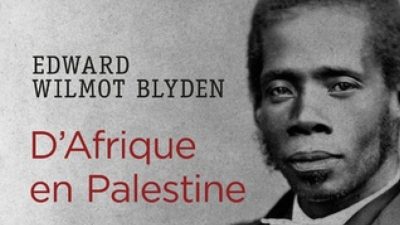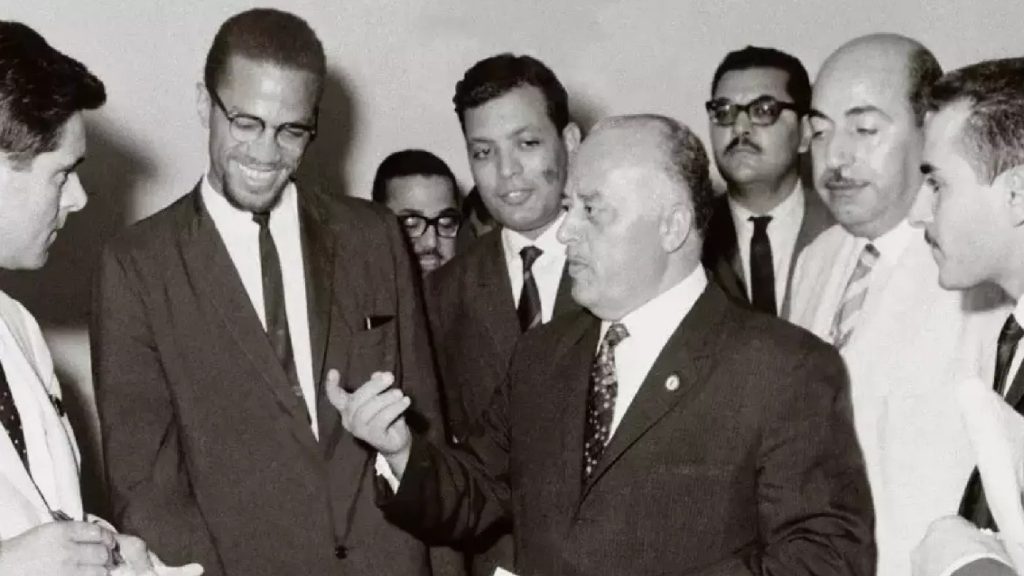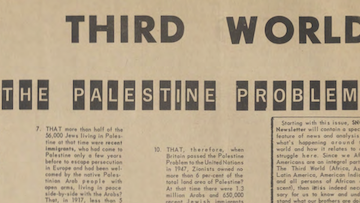Pan-Africanism and Palestine Solidarity, Then and Now
Part I: From the era of Malcolm X to the present, progressive forces have supported the Palestinian and Arab struggles against Zionism and Imperialism

All Global Research articles can be read in 51 languages by activating the Translate Website button below the author’s name (only available in desktop version).
To receive Global Research’s Daily Newsletter (selected articles), click here.
Click the share button above to email/forward this article to your friends and colleagues. Follow us on Instagram and Twitter and subscribe to our Telegram Channel. Feel free to repost and share widely Global Research articles.
Big Tech’s Effort to Silence Truth-tellers: Global Research Online Referral Campaign
***
19th century theorist and educator Edward Wilmont Blyden (1832-1912) viewed the struggle for African redemption as being comparable to the Zionist movement, then in its infancy.
As the founders of the World Zionist Movement allied themselves with the imperialist powers of the late 19th and early 20th centuries, Blyden, who was born in the Caribbean during the period of African enslavement, became a staunch advocate of migration to the African continent.
During his formative years in the Danish West Indies, now known as the American Virgin Islands, Blyden under the mentorship of Protestant Minister John Knox was brought to the United States in 1850 seeking admission to three theological colleges. He was rejected by these institutions of higher learning due to his race.
Knox then encouraged Blyden to migrate to Liberia, a nation created by the American Colonization Society (ACS) for the repatriation of free or manumitted Africans in the United States. The ACS had been controversial among many Africans living in the U.S. whose primary objective was the abolition of slavery and the securing of equal rights.
Blyden wrote extensively on African history and culture as a journalist and academic in Liberia, Sierra Leone and Nigeria. While in Liberia, he worked as a school principal, college professor and was ordained as a Presbyterian minister. Between the 1860s and the 1880s, he served in several Liberian governmental positions as Secretary of State, Secretary of the Interior and even unsuccessfully contested for the presidency in 1885.
Later Blyden published his most well-known book entitled “Christianity, Islam and the Negro Race” (1887) where he suggested that Islam was a religion more suitable to the people of Africa. However, during the life of Blyden, the exploitative systems of slavery and later colonialism were at their heights of influence. It would take the emergence of two imperialist wars in the 20th century for the African independence struggles to fully emerge seeking the liberation of nation-states and continental unity during the mid-to-late 20th century.
Scholar Michael Williams in his article entitled “Pan-Africanism and Zionism: The Delusion of Comparability”, chronicles the role of Zionist thought and its influence on thinkers and activists seeking identification and repatriation to the continent. He concludes the report by emphasizing:
“It would be remiss to conclude this review without noting that not all persons today, or in the past, who have in some way been associated with either or both of these movements, have shared this delusion of comparability. There are a few notable exceptions. For example, Pan-Africanist Malcolm X viewed Zionism with utter disgust, albeit through an Islamic prism.”
While in Egypt during September 1964, Malcolm published an article in the Gazette on the question of Zionism. He refutes the notion of a religious basis for the occupation of Palestine while placing the struggle against Zionism within the context of the movements against colonialism and imperialism.
Malcolm X says in this article that:
“The Israeli Zionists are convinced they have successfully camouflaged their new kind of colonialism. Their colonialism appears to be more ‘benevolent,’ more ‘philanthropic,’ a system with which they rule simply by getting their potential victims to accept their friendly offers of economic ‘aid,’ and other tempting gifts, that they dangle in front of the newly independent African nations, whose economies are experiencing great difficulties. During the 19th century, when the masses here in Africa were largely illiterate it was easy for European imperialists to rule them with ‘force and fear,’ but in this present era of enlightenment the African masses are awakening, and it is impossible to hold them in check now with the antiquated methods of the 19th century. The imperialists, therefore, have been compelled to devise new methods. Since they can no longer force or frighten the masses into submission, they must devise modern methods that will enable them to maneuver the African masses into willing submission.’
Malcolm foresaw an alliance between African and Arab states in opposition to imperialism. Initially he made reference to his rejection of Zionism on the basis of religious affinity with other Muslims who were of dark complexions. After leaving the Nation of Islam in March 1964, Malcolm X (El-Hajj Malik El-Shabazz) took on a more secular approach to the Zionist question.
In a recent article published by the Middle East Eye, it reports:
“Malcolm travelled from Egypt to Gaza on 5 September 1964. At the time, the Gaza Strip was under the control of Egypt (which took over the enclave in 1948) and therefore travel between the two territories was relatively smooth. According to his travel diaries, Malcolm visited the Khan Younis refugee camp, which was created in 1949 following the Nakba to house people displaced from other parts of Palestine. He also visited a local hospital and dined with religious leaders in Gaza. Later in the evening, the American preacher met renowned Palestinian poet Harun Hashem Rashid, who described to him how he narrowly escaped the Khan Younis massacre of 1956…. On 15 September, in Cairo’s Shepheard’s Hotel, Malcolm met with members of the newly formed Palestinian Liberation Organization (PLO), including Ahmad al-Shukeiri, the group’s first chairman.”
Malcolm X meets with Palestinian leaders at the Sheppard Hotel in Cairo during 1964
After the assassination of Malcolm X on February 21, 1965, new forces would emerge in the solidarity efforts between African Americans, Palestinians and other progressive forces within North Africa and West Asia. The rebellion in Los Angeles during August 1965 revealed the rising frustrations and political consciousness among the Black population in the U.S.
SNCC, the Six Day War and Palestinian Solidarity
After the nationalist and Pan-Africanist shift within the Student Nonviolent Coordinating Committee (SNCC) with the ascendancy of Stokely Carmichael (later known as Kwame Ture) in the Summer of 1966, a greater emphasis was placed upon international solidarity. In the following year, 1967, H. Rap Brown (now known as Imam Abdullah al-Amin, was elected Chair of SNCC.
James Forman, then the International Affairs Director for SNCC, described 1967 as the “High Tide of Black Resistance.” Forman and SNCC lawyer Howard Moore, traveled to Kitwe, Zambia to participate in the UN-sponsored conference on the struggle against white-minority rule in Southern Africa held in July 1967. (See this)
When war erupted in early June 1967 between Egypt, Jordan, Syria against the State of Israel, SNCC sided with Cairo, Amman and Damascus. The organization came under fire from the ruling class and its Zionist operatives when their newsletter published an article written by Ethel Minor on the Palestinian question.
Minor had been a member of the Nation of Islam (NOI) in the early 1960s. When Malcolm X broke with the NOI, she left in solidarity with the former national spokesperson of the organization. After the martyrdom of Malcolm X, she joined SNCC and later became Communications Secretary for the group.
In the June-July Newsletter of SNCC, Minor wrote an article entitled “The Palestine Problem: Test Your Knowledge” which consisted of a series of questions about the history of the region. Initially it was not considered a formal position of the organization. Nonetheless, on August 15, 1967, SNCC issued a statement entitled “The Middle East Crisis” articulating their position on the Palestinian question and the recent fighting labeled as the “six-day war.” See this and this.
The views of Malcolm X’s Organization of Afro-American Unity (OAAU) and Muslim Mosque, Inc. set the course for the burgeoning anti-Zionist and pro-Palestinian sentiments in the African American community. Solidarity with Palestine was reflective of the positions of progressive and socialist oriented states on the African continent.
Forman noted that in June 1967, he and other SNCC leaders were summoned by the UN Mission of Guinea-Conakry which spelled out its views on the six-day war and the importance of solidarity with the Palestinians. Between 1948 and 1967, millions of Palestinians were forced from their historical homeland. Thousands of others were killed due to Israeli aggression backed by U.S. imperialism and its allies.
During the late 1960s and 1970s, the issues related to the status of Palestinians became more pronounced. Under the administration of President Jimmy Carter, the veteran civil rights leader Andrew Young was dismissed from his position as UN Ambassador for the U.S. for merely holding a meeting with a representative of the PLO. This action by a Democratic White House illustrated the strategic significance of the State of Israel to the overall role of imperialism in the 20th century.
*
Note to readers: Please click the share button above. Follow us on Instagram and Twitter and subscribe to our Telegram Channel. Feel free to repost and share widely Global Research articles.
Abayomi Azikiwe is the editor of the Pan-African News Wire. He is a regular contributor to Global Research.
Featured image: Edward Wilmot Blyden on Africa and Palestine; All images in this article are from the author



